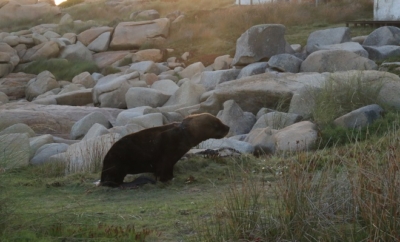
Self-Actualization
Developing Talent
Have you ever played one of those RPG games where you start out choosing one of the available characters and then assign a pool of points to his or her various attributes? You might have to decide amongst being a wizard, knight, or archer, for example. Then you have the choice to increase his skill level in areas like strength, vitality, magic, or stealth.
I like this example as a metaphor to describe human growth and self-actualization even though it’s rather silly because it helps people visualize the interplay between natural talents and the environmental factors that assist in developing or hindering these talents.
If you choose to be a wizard then you will have an easier time picking up and developing skills associated with magic and have a higher ceiling of ability in it. However, if you wanted to you could fight an uphill battle and assign all the points you accrue to other areas like strength.
What I notice all the time in counseling is that people do not recognize their inherent abilities, usually because they aren’t socially sanctioned. They don’t meet the slim criteria for abilities that our culture views as most desirable, like scientific or mathematical acumen. They are wizards who don’t know they are wizards, and they are trying desperately to be knights. Just like in an RPG, we can all develop talents in almost any area, but doing so is a lot easier and usually more fulfilling when they align with our natural abilities.
As your character in the game progresses through his adventure he will improve all of his skills, but there are different ceilings in the various categories. In life, a feeling of efficacy comes out of pursuing interests where we have some natural talent because our ceiling of expertise is higher. Everyone has the ability to do something better than the majority of the population. Think about some inherent abilities you have always had. Don’t confine yourself to societal norms or expectations. It could be making people feel comfortable in awkward social situations, or being really funny, or having quick hand to eye coordination. It could be anything. Then ask yourself how much time and work you have put into developing these aspects of your Self. It’s ironic that many leave their natural abilities untouched, believing that since they already have skill there they don’t need to improve upon it. Instead they spend their time trying to develop in areas where they don’t have much intrinsic talent to begin with.
Related posts:
- Appreciate Your Natural Talents Some of us discount the things that come easy to us and are only really proud of the things that take a lot of hard work. While it’s quite healthy to take pride in those achievements where we have confronted and overcome challenges, one of the hidden dangers is that when we take our natural […]...
- Doubters When we express our dreams and life goals we are frequently confronted by doubters and skeptics who tell us why it’s not going to work and try to hold us back. Just as frustrating, when we produce an original idea or accomplish something of value we find that many question whether we were actually responsible […]...
- Neurotic Pride There is a type of person you may have come across who finds it really difficult to recognize the talents and abilities of others, especially when they exceed their own talents and abilities. For example, an aspiring musician might go to a rock concert with some friends, and afterwards when they ask him about the […]...
- Admiration And Envy Admiration can be a positive force in our lives. Having people to look up to gives us a clear idea of the traits and talents we value and these people often point the way for our our own growth and development. From an existential point of view admiration helps us recognize the gap between where […]...
- Feeling The Need To Prove Yourself To Others Feeling the need to prove yourself to others is directly proportional to how much you have proven to yourself. In other words, if you’re sure of your own talents, abilities, and accomplishments others’ opinions won’t matter to you much but if you’re secretly unsure of your talents, abilities, and accomplishments these opinions will matter to […]...
- Increasing Self-Esteem Before thinking about increasing your self-esteem you have to figure out if it is currently low, a task that is more difficult than you might think because appearances can be deceptive and we get just as good at lying to ourselves as we do to everyone else, especially when the subject we are trying to […]...
- Natural Ability And Passion There are people who are passionate about an endeavor but don’t have much natural ability in it and there are people who have a lot of natural ability in an endeavor but aren’t very passionate about it. The key for your happiness and success is to find, through trial and error, an area of interest […]...
- Not Making Progress Fast Enough One of the main reasons people quit their endeavors before achieving what they set out to do is that they don’t believe they’re making progress fast enough, they’re not as far along as they think they should be. This sort of thinking is often a protective mechanism meant to preserve the idealized self-image in the […]...
- How To Achieve Success Even when you find success you will recognize that many factors completely outside of your control had to go your way for things to work out. The relationship between skill and luck is a tangled mess and is sometimes difficult to tease out. The fact that external success is dependent upon variables outside of your […]...
- Everyone Struggles With Something Sam: Yeah, but I tried, I tried hard. Rita: Try harder! Sam: Yeah, but you don’t know, you don’t know! Rita: I don’t know WHAT? Sam: Yeah, you don’t know what it’s like when you try, and you try, and you try, and you try, and you don’t ever get there! Because you were born […]...
- Natural Talent And Hard Work Are Almost Never Found Together What we usually see is either lazy talent or hard work with little talent but rarely do we find that dynamic, almost unstoppable combination of innate natural talent and hard work. Why are the first two types so common and the third type so rare? From our psychological point of view lazy talent can be […]...
- Flexibility and Balance These are probably two of the most obvious metaphors you can apply from the practice of asanas to your life, but it doesn’t make them any less powerful. How could you spend time each day mindfully concentrating on both elements without starting to apply the concepts to everything else you do. Just like all of […]...
- Managing Jealousy Some people will tell you that jealousy can be a good thing because it’s a motivating force. You see what someone else has, that you are lacking in this area, and you feel compelled to work until you have it too. Even if this is true it’s an attitude that takes all the joy out […]...
- Group Narcissism We usually think of narcissism as being specific to the individual so what do we mean by group narcissism? To understand the phenomenon we first have to understand that the individual narcissist usually does have some traits or talents that allow him to showcase his narcissism without a lot of push back from the outside […]...
- Self-Actualization And Sticking With One Interest If you have spread your time and attention amongst different hobbies, activities, and disciplines throughout your life and gotten pretty good in many of them but reached mastery level in none of them this article is for you. The real question is, what made you switch from one interest to the next before getting far […]...
- Changing Your Dominant Narrative If you’re working on changing your dominant narrative, the entrenched global story that controls the way people think about and relate to you, not to mention how you think about yourself, you’re fighting an uphill battle because of confirmation bias. Confirmation bias is the cognitive bias where we look for data to confirm our preexisting […]...
- Growth Versus Stagnation Happy people find themselves in a state of growth. Unhappy people find themselves in a state of stagnation. Growth says “What I am today is not necessarily what I will be tomorrow.” Stagnation says “What I am now is all I will ever be.” Growth is imbued with hope, with ever-expanding possibilities, while stagnation is […]...
- Opposites Attract “You complete me.” The iconic line from ‘Jerry Maguire’ is known by just about everyone and most consider it a symbol of what romance and true love should be. Yet the sentiment expresses an unconscious mentality running throughout our Western culture that is detrimental. We hope we can find fulfillment and a sense of wholeness […]...
- Do Not Expect Others To Recognize Your Talent There is a pretty common secret belief of those who are innately talented in some area, which is basically that the red carpet should be rolled out as a matter of course. Their talent is so obvious to them that it goes without saying it should be obvious to everyone else too. If follows that […]...
- Passion is the Key to Success “If you care enough for a result, you will most certainly attain it.” – William James Lots of clients wonder why they fell short while friends and acquaintances found success. Most of them end up coming to a similar conclusion after careful analysis, which is that they just didn’t care enough to stick with what […]...




